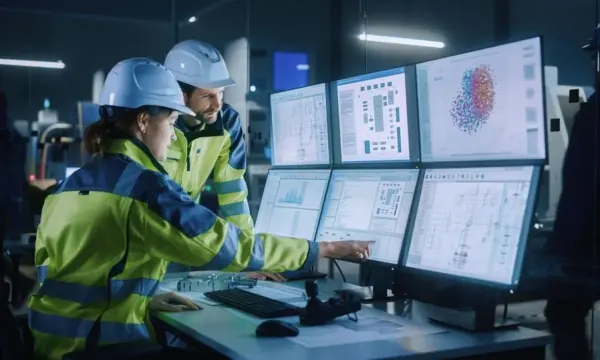Transforming the Landscape: The Impact & Future of AI on the Construction Industry
Posted April 11, 2024 by nishbandara89
AI in construction, poised for monumental growth, projects a surge from $496.40M in 2021 to $15.1B by 2032. Despite current adoption challenges, AI promises significant economic impact, enhanced safety, and efficiency in the sector.
In an era where technology continuously reshapes industries, the construction sector stands on the brink of a monumental transformation, heralded by the integration of Artificial Intelligence (AI). Recent comprehensive analyses and forecasts reveal a future where AI not only revolutionizes the way we build but also significantly contributes to global economic growth, enhanced safety, and operational efficiency.
The Future is Now: Unprecedented Growth in AI Adoption
The global market for AI in construction, currently valued at $496.40 million as of 2021, is projected to soar to an astounding $15.1 billion by 2032, reflecting a growth trajectory unparalleled in the industry's history. This surge is powered by a compound annual growth rate (CAGR) of up to 34.1% in certain forecasts, underscoring the sector's rapid evolution and the growing acknowledgment of AI's potential.
In North America, AI in construction is expected to account for a significant 32% of the global market growth, with Asia Pacific not far behind, projecting an impressive 34.9% growth from 2022 to 2031. These numbers are a testament to the global embrace of AI technologies, driven by the pursuit of efficiency, cost reduction, and innovation.
Bridging the Gap: From Adoption to Full Integration
Despite the enthusiasm, the journey towards fully integrating AI in construction processes reveals a landscape filled with challenges and opportunities. Currently, only 7% of construction companies have fully integrated AI into their operations, suggesting a vast potential for growth and adoption. However, the future looks promising with 56% of companies in the engineering, construction, and infrastructure sectors planning to implement AI within the next three years.
AI: A Catalyst for Economic and Operational Transformation
The economic benefits of AI in construction are staggering, with projections indicating a potential $13 trillion global economic impact by 2030. Specific instances, such as the Kaiser Permanente project in San Diego, have already showcased AI's ability to increase labor productivity by 38% and save 11% on budgets.
Beyond economic benefits, AI promises to enhance safety on construction sites, potentially reducing workplace injuries by an estimated 20%. Additionally, AI's integration into Building Information Modeling (BIM) and Automated Building Management Systems could slash energy consumption in commercial buildings by 35% by 2040, marking a significant step towards sustainability.
Innovation and Strategy: The Road Ahead
Despite the clear advantages, a gap in strategic AI implementation remains, with only 11% of professionals currently having an AI strategy in place. However, the industry is poised for rapid change, with a 300% increase in AI-related patents since 2010 signalling a surge in innovation and adoption.
Conclusion: A New Era for Construction
As the construction industry stands on the precipice of this technological revolution, the consensus among professionals is clear: AI will fundamentally transform the sector, driving innovation, efficiency, and safety to unprecedented levels. The future of construction, powered by AI, promises not just buildings, but smarter, safer, and more sustainable environments for generations to come.
For further insights and detailed statistics, please refer to the comprehensive roundup on AI in Construction: Stats, Facts & Figures.

| Contact Email | [email protected] |
| Issued By | PropertyWiki |
| Website | PropertyWiki |
| Country | Australia |
| Categories | Construction , Technology |
| Tags | construction , ai , technology |
| Last Updated | April 11, 2024 |


